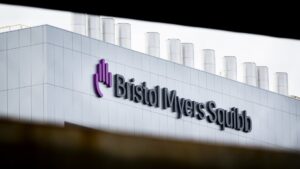Bristol Myers Squibb Surges Past Expectations: A Deep Dive into Its First Quarter Results
At Extreme Investor Network, we keep a close eye on the pharmaceutical sector’s dynamic landscape. This week, Bristol Myers Squibb (BMS) announced impressive first-quarter results, beating Wall Street estimates and lifting its revenue and profit outlook for 2025. This analysis will help you understand why investor interest in BMS is burgeoning and what this means for the broader market.
Performance Overview
On Thursday, BMS reported a stellar first-quarter performance, exceeding expectations with earnings per share (EPS) of $1.80, significantly above the analysts’ forecast of $1.49. The drugmaker generated $11.2 billion in revenue, also surpassing the anticipated $10.7 billion. Notably, the company recorded a significant recovery, posting a net income of $2.5 billion compared to last year’s staggering loss of $11.9 billion.
Bristol Myers has adjusted its full-year guidance to predict 2025 revenues between $45.8 billion and $46.8 billion, up from an earlier estimate of approximately $45.5 billion. They now project adjusted earnings ranging from $6.70 to $7 per share, an improvement on their prior forecast of $6.55 to $6.85.
Strategic Cost Management
While strong sales from its newer drug portfolio contributed to this financial uplift, BMS is not resting on its laurels. The company is aggressively pursuing a $2 billion cost-cutting initiative by 2027, complementing an existing plan to reduce expenses by $1.5 billion by the end of this year. This proactive approach positions the company to remain competitive, particularly in a market affected by rising tariffs and shifting regulatory environments.
Navigating Challenges: Tariffs and Supply Chain
In an era of increasing tariffs, Bristol Myers has stated that their guidance includes impacts from existing tariffs on U.S. products shipped to China. China represents a critical growth avenue for BMS, with their "China 2030 Strategy" aimed at bringing innovative medications to address serious health issues, including gastric cancer.
However, the company revealed that they do not expect the forthcoming tariffs on pharmaceuticals imported into the U.S. to significantly affect their outlook. CFO David Elkins emphasized their manufacturing flexibility, highlighting a robust global network that allows the company to navigate potential disruptions seamlessly.
Portfolio Strength
The solid first-quarter results are evidenced by a 16% increase in revenues from BMS’s growth portfolio, totaling $5.56 billion. Products like Opdivo and their new schizophrenia drug Cobenfy, despite a disappointing clinical trial, contributed to healthy revenue streams.
- Sales Breakdown:
- Eliquis: $3.57 billion (+4% YoY)
- Opdivo: $2.27 billion (+9% YoY)
- Cobenfy: $27 million (newly launched)
With top-selling drugs like Eliquis expected to lose market exclusivity by 2028, BMS is banking heavily on its growth drugs to offset declines.
Future Outlook
CEO Christopher Boerner acknowledged ongoing uncertainties, from tariffs to economic conditions and FDA restructuring efforts. However, he remains resolute, emphasizing BMS’s commitment to delivering value to patients and shareholders alike. This sentiment highlights the importance of being agile and adaptable in today’s pharmaceutical landscape.
What This Means for Investors
Bristol Myers is a shining example of resilience within the pharmaceutical industry. With proactive cost management, a robust product pipeline, and an unwavering focus on market needs, the company’s prospects look brighter than ever. Investors should keep a close eye on how BMS continues to leverage its global manufacturing capabilities, especially regarding the evolving regulatory environment.
At Extreme Investor Network, we believe that informed investors can navigate market complexities better. Stay tuned for more insights as we continue to follow Bristol Myers Squibb and other giants in the healthcare sector!

